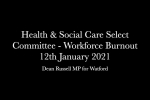Q185 Dean Russell: Amanda, I want to pick up an earlier comment about digital. I am the chair of the APPG for digital health. We have been doing a lot of work around data and the importance of that. One of the words I see a lot is “efficiency”, when it comes to the challenge of the 10% of time spent on paperwork or notes and so on that my colleague mentioned earlier. Is there a concerted effort at the moment to look at how digital can help improve efficiencies, effectiveness and patient outcomes? I hear it talked about a lot. I know there is NHS Digital, NHSX and all of those things, but one of the things I never quite hear is that there is a programme to say, “We are going to fully digitise the NHS,” and that in 10 years’ time a patient will not have to repeatedly put in the same information, and the GP will not have to give the same information to a pharmacist that they have done 10 times over. Could you give me an update, and if that is being looked at, please?
Amanda Pritchard: We would completely agree with your findings. Two things are probably worth saying. We would absolutely agree that if we want to achieve a modern, efficient health service, we will not do it if we are not able to put that digital underpinning in place. There are two big things that are the focus at the moment. One is frontline digitisation. About a fifth of trusts in the NHS are still largely paper based. We have some that are absolutely at the other end, but that is a very important thing to be able to fix if we are to achieve some of the interconnectivity we were talking about earlier. The second thing is that we have seen, particularly over the last couple of years, the value of the NHS app and the ability for people to access their own care record and access services through the app. Another thing that colleagues are working on is how we can continue to build more sophisticated functionality in the app so that we are doing both the work that is needed to put frontline digitisation in place and the piece that then makes it accessible to patients, recognising that there will always be a really important element around digital inclusion that needs to be considered as part of that. The point you will be all too well aware of is that we can only go at the pace we have funding available. What we are determined to do is make the most of the money that we have to continue to put that into the digital transformation space.
Q186 Dean Russell: Words that came up repeatedly were beds in hospitals and their utilisation. I know that in my local hospital they have been doing some great work around virtual wards, for example. Has there been an analysis, looking at the next 10 to 20 years, to say how many beds we actually need in hospitals, which of course is critical, and what the opportunity is through digital to enable greater use of virtual wards to enable people to stay at home, for example, where they can, and be looked after at home but with access to facilities?
Amanda Pritchard: I think Steve might want to come in on this because he has already talked about some of the pressures on beds we have at the moment in the NHS. We have about 5,000 beds out of normal action at the moment, with a combination of necessary infection control measures to make sure that patients are safe when they are in hospital, and the inability to use beds when we have Covid patients in them. We need to keep the surrounding beds free to make sure that infection control arrangements are secure. There is clearly an immediate challenge for us around capacity. Part of what we are doing to mitigate some of that is looking at how we can build on the very successful virtual wards that exist across the country. Some of them were set up in Covid specifically to look after patients with Covid, but some were pre-existing. There is a huge amount of potential and enthusiasm to build on that success to see how much further we can safely take it. Again, of course, it requires the right workforce. It requires digital underpinning. We have seen some real successes over the last few years that we are extremely keen to build on for the future.
Professor Powis: I think we need to do a number of things. Of course, we need to use beds efficiently. That goes back to the sort of clinical pathways that we were hearing about before, ensuring that we have the most efficient use and throughput of patients coming through beds. The virtual ward, in a sense, is another journey beyond the day-case surgery move that we made a number of years ago. When I was a child, I remember being in for two weeks after a tonsil operation. Now, it is much more a day case. Virtual wards are part of that journey, where we can treat people at home rather than bringing them in. We need to ensure that we have efficient discharge in place. That goes back to making sure that social care is working well so that patients who are fit to leave hospital do not end up staying in hospital longer than they need to. We need to do things such as the hot/cold splits that you have heard about, to ensure that we separate emergency beds from elective beds. Probably, once we have done all that, we need more beds than we have at the moment. One of the things that we need to think about post pandemic is exactly the headroom in the NHS. If you recall, prior to the pandemic, Lord Stevens, Amanda’s predecessor, called for extra beds, particularly as we get into the winter. I think the pandemic has highlighted that we need to have a sensible discussion about the level of headroom in the NHS to ensure that either during the winter, when emergency services run hot and we know that elective care gets impacted, or for unusual events such as pandemics we have that reserve in place.
Q187 Dean Russell: On a more practical level, as I have mentioned in this Committee before—forgive me for repeating it—I volunteer at my local hospital, very much so last year during the pandemic, and I continue to. One of the aspects of that is very mundane stuff, but it makes a difference. It is making teas and coffees, taking patients’ gifts and belongings to them when people come to drop them off. It seemed to me that that takes an awful lot of strain off the nurses and staff who are doing their jobs. I made the point to the Prime Minister in PMQs a while ago about an NHS cadet scheme. There is a St John Ambulance version, but my take was broader and more available across the UK. Has there been any more discussion of that? My sense is that that volunteering group—they can’t really be called a workforce—especially young people, seem to add a huge contribution and take a lot of strain off the staff who are already very busy. It also enables them to see what the NHS is like up front and close, and has probably inspired many of them to want careers there. Has there been any more talk post pandemic of how we encourage more volunteering in the NHS?
Amanda Pritchard: Again, it would be almost impossible to overstate how valuable the volunteers have been for the NHS over the last couple of years. I do not think anybody wants to go anywhere other than forward in trying to make sure that volunteers are welcomed as a core part of the wider NHS and social care workforce. We have lots of different schemes going on. Certainly, the work that you have just described around the cadets is part of that. Broader partnerships with the voluntary sector at both local system level in individual organisations and nationally is very much what we are keen to do to build on some of the experience of the last couple of years.
Q188 Dean Russell: But is there infrastructure being looked at to be able to monitor, manage and train those volunteers at the moment? Is that being looked into officially?
Professor Powis: I was going to make two additional points, but, yes, there is. Amanda mentioned the sort of reserve force that we are putting in place. The ongoing training and readiness is part of that. The two additional points I was going to make, which go back to your original question on digital and on beds, are around capital. We have had the discussion about revenue funding, but we need to think about capital funding as well. Of course, that is really important for the long term. Ensuring that we have the capital investment to deliver digital services, put them in place and ensure that our estate and our beds are fit for purpose is really important. Obviously, that is a discussion we are having with Government. The second thing is around the type of estate. Personally, I feel that coming out of the pandemic, one of the things that we really need to think hard about is the number of single beds we have. We need to move much more in our hospitals to single rooms being the default for privacy and dignity, for infection control and for the flow issues we have been talking about. That is something we need to think hard about as we build the hospitals of the future.
Chair: Thank you.



